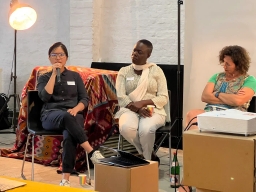Yassir is one of the first North African companies to join the prestigious Silicon Valley based Accelerator Programme YCombinator (YC). We learned a lot through this experience and gained valuable insights in product development, scale up and entrepreneurship.
So it was only natural that earlier this year, we invited our teams at Yassir to join YC Future Founder school, an online curriculum targeting future startup founders, so they can learn more about the nuts and bolts of building a startup. This 8 weeks program offers would-be entrepreneurs a great opportunity to learn and experiment with launching a product from creating something based on people’s needs, to managing startup finances, getting investment, pitching, etc. Something that product managers especially need in today’s startup world.
We asked some of our folks who joined the program to share their learnings and here’s what they have to say.
What did we learn from YC’s future founder school?
1. If you can’t launch it in two weeks, it’s not an MVP
This is an interesting way to look at things, as it is preferable for any startup founder to consider not overdesigning or overbuilding a project. Instead, the main focus should be on having a presence in the market, and knowing the users needs, before jumping on other details.
The same thing goes for PMs in larger companies, you need to launch as minimally as possible, all while listening to users figure out how to optimize your product, given the difficulty to perfect your product assumptions from the beginning.

2. The importance of having a company culture
Having a company culture is one of the pillars that set your startup for growth, as it encourages everyone in the team to be focused on one goal. Take for example, Silicon Valley, whose one of the most common mottos is: “Work hard, play hard”. No matter how simple they are, strong words and quotes can push teams across all departments to adapt to the same working style and share the same values.
3. Surround yourself with people who get things done
If you are a startup founder, someone who’s hiring, or a PM, you need to make sure that you are encouraging a sense of ownership and taking initiative across all team members. Hiring for a get-things-done mindset is one of the most successful methods to set your teams for success.

4. Write code and talk to users
Maybe you have heard about this before, being a piece of great advice for entrepreneurs, PMs, designers, and Engineering Managers need to follow. It brings focuses on two things: building and user needs. Fundamental factors to be successful in today’s world
5. Find a tech co-founder
If you are trying to start a startup but don’t have enough technical skills, you will need to have a tech co-founder by your side. As you will always need to iterate on the product you are building to meet the customers needs. The only way to outsource your tech without burning a lot of cash is to find a good technical co-founder.
6. Learn how to pitch
When you have a startup, you will always be asked about what you are working on, therefore it is very important that you learn how to explain your work concisely, otherwise people will lose track of what you are saying. What you can try to do is find the most abstract phrase to describe what you are working on. For example, if you want to pitch a startup like Yassir (YC 20W), you can say:
Yassir is the first African Super App, to move people, packages, food, and money.
With such a phrase, people can easily figure out what our services are, who our customers are, and how we interact with them.
Try using this template: Building x, for y, to make them do z

7. Build things that don’t scale
You may know the story of Airbnb founders and how they built the business without a scalability system. For example, when they launched a website even without a payment method, or when they used to visit different houses on the platform to meet the owners and ask them about the overall experience. But there are other stories of billion-dollar companies who achieved many things that aren’t scalable at all. Facebook, for example, was simply cloning its backend and database along its expansion as a company.
Simply get things done and don’t over-engineer it.
8. Competition is for losers
Competition is for losers to try to get a monopoly over a small and growing market. If you are still looking for a good startup idea, here’s a nice tip for you: don’t run after mature markets. Run after a small market with a big potential to grow in the future, if you do that, you might have a big chance to be the market leader in that segment.
Takeaways
- Fail fast and fail forward, build things as quick and cheap as possible, launch your product to the market, get users’ feedback and repeat.
- Express your thoughts clearly when you are pitching to investors, talking to customers, or talking to your grandmother, you will always need to describe what you are doing as quickly and as efficiently as possible.
- Sounds crazy but be right, you will always find resistance to what you are building. Know that no matter what you want to create, you need facts and insights from and about users to encourage people to support your narrative.




